
Read about the last study tour to Mexico: http://www2.uregina.ca/education/news/international-study-tour-to-mexico/

Read about the last study tour to Mexico: http://www2.uregina.ca/education/news/international-study-tour-to-mexico/
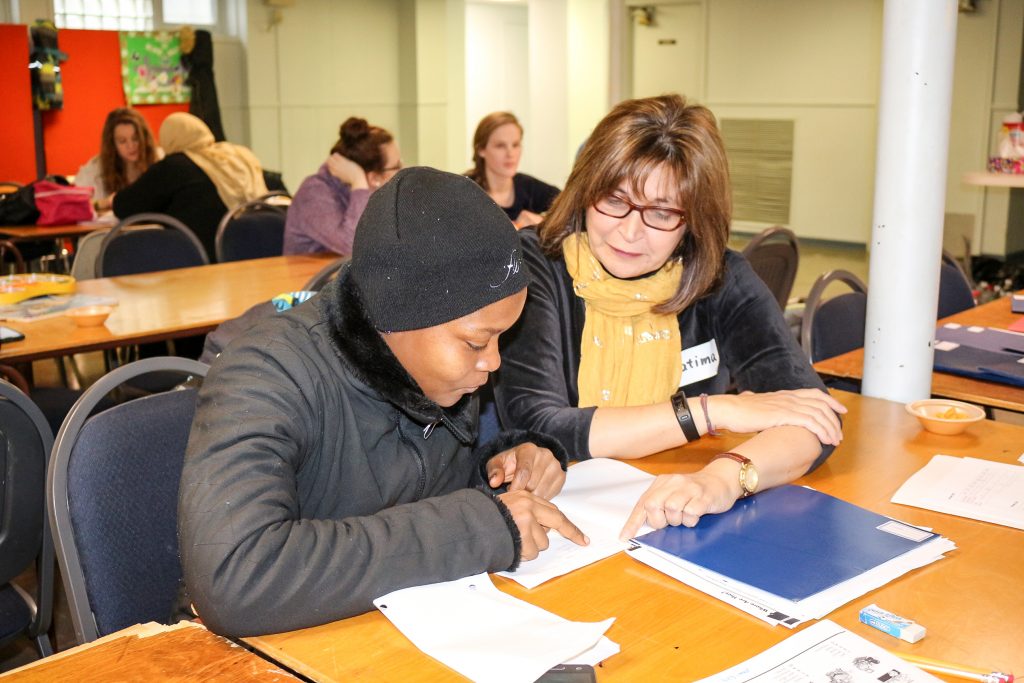
ELNG 200 students are volunteering in a community-based language program for new Canadian women with infants and preschool-aged children. The program was developed by the Faculty of Education’s Dr. Fatima Pirbhai-Illich and Professor Emeritus Dr. Meredith Cherland in partnership with the Saskatchewan Synod of the Evangelical Lutheran Church in Canada (ELCIC).
ELNG 200 is a second-year Faculty of Education course that prepares future teachers to support students learning to speak, read, and write the English language. As part of the course requirements, students must be involved in 8-10 hours of critical service volunteering. However, with approximately 30 students per course looking to fulfil their volunteer requirements in teaching English as an additional language (EAL), this requirement can pose a difficulty. Dr. Fatima Pirbhai-Illich, who teaches the course, says, “Sometimes students are left scrambling.” Thus, she began looking for new venues where her students could volunteer.
Dr. Pirbhai-Illich approached a colleague, Professor Emeritus Dr. Meredith Cherland, about the needs of her students. Dr. Cherland, who is chair of the Welcoming the Newcomer Committee for her church, Our Savior’s Lutheran Church in Regina, had been working with the committee, filling out federal forms of application for sponsoring a Syrian family of six. The committee was aware that the process would take several more months and they were asking themselves what to do in the meantime.
Meredith had met 18-year-old Finda Sam, her husband Amos Kamato, and their baby boy at church. Meredith says, “The couple had spent many years of their young lives in a refugee camp in Guinea, although they were born in Sierra Leone. Their first language is Kisi, an African language I had never heard of.” Finda had approached Meredith, asking if she could help her to learn to speak English better, and to learn to read and write English. Finda was waiting for a childcare opening before she could begin English classes at the Open Door Society. “The classes at Open Door and the Library have a limited number of spaces and there are wait lists,” says Meredith.
With Finda’s situation in mind, Meredith and Fatima started thinking about the many new Canadian women in Regina who could not attend EAL classes because they had babies or preschoolers to care for. They began working to set up a community-based language program for newcomers to Canada, specifically those who are on waiting lists for language classes through the Open Door Society, the Regina Public Library, and the Regina Immigrant Women’s Centre. Fatima with her extensive EAL background was willing to teach a language and literacy class for newcomer women with babies or preschoolers on Tuesday and Friday mornings. This would also give her U of R ELNG 200 students opportunities for volunteering.
Thus resolved, Fatima and Meredith began looking for a space, and were at first discouraged because they had no budget. Meredith, then, applied to the Saskatchewan Synod of the Evangelical Lutheran Church in Canada (ELCIC) for funding. The ELCIC awarded them $1,100.
Central Lutheran Church offered them space without charge. “This is the most important part,” says Fatima, “It’s amazing, and we wouldn’t have been able to offer the program without it.”
The funding, then, would cover tea, juice, and snacks for the students and their children and the services of a coordinator. Cynthia Schultz, a University of Regina master’s student in the Faculty of Education, was hired as the coordinator.
With a space, a teacher, a coordinator and volunteers in place, they advertised the course at the Open Door Society, the Regina Public Library and the Lutheran churches in Regina. The first class was offered on October 4.
Coordinator Cynthia Schultz says, “So far, we have only held five classes, but we have had 11 women attend, with nine attending regularly, and about nine children under the age of five attending. Around seven students from Fatima’s class [ELNG 200] come on Tuesday mornings and nine on Fridays.”
Others from the Faculty are also involved. Dr. Christine Massing helps with the children on Tuesdays. The students from ELNG 200 and students from Fatima’s master’s classes have taken this opportunity to donate items such as diapers and clothing for the EAL students to take home. Yan Yang, a PhD student, also comes out to help tutor each week.
Some women from the Lutheran Church are also volunteering, helping with set up and bringing homemade halal snacks once per week. Bernice Casper, a volunteer from Our Savior’s Lutheran Church, says, “I think this is so wonderful for new Canadians to have this opportunity to learn English one-on-one—it’s one-on-one—that’s what I want to emphasize about this program. I also love the interactions between the U of R students and the English students.”
Fatima prepares all the course material after assessing where EAL students are at with their English. She also assists her ELNG 200 student volunteers with strategies for teaching EAL. The Regina Public Library has helped with curriculum.
EAL student Rasha has been attending the program for one month and says she likes it; “I’m learning many words,” she says. She is finding new friends through the program; “We help each other with English.”
University of Regina student Jenna Magnusson works with Rasha as her EAL tutor. Jenna says, “This has been a good experience. I’m gaining insights about people learning English.” One of her strategies is to use her Google translator to look up a word in Arabic when her student gets stuck on a word.
EAL student Finda Sam works with U of R student Jonah Norman-Gray. Finda also likes the program and says she is learning. She says, “I want to learn to read, to read and write.” She would also like to learn to drive. Once these skills are in place, she will consider what she would like to do in the future.
What has volunteering taught him? Jonah says, “Awkwardness [when teaching EAL] is not a problem. Situations where you are not sure what to say are normal. Awkwardness just means you care about the situation.” Working as a volunteer in this program is important to Jonah because, he says, “I will be using this [experience] in the future–I think it is very important work.” Jonah adds, “It is good to see this kind of program show up in a grass-roots scenario. This is beautiful–it is the goodness of people.”
Miriam, a mother of four, has also found the program helpful. She says, “Everyone helps me learn English.” She has also found new friendships through the program. U of R students Taylor Raby and Darian Kaszas work together with Miriam using a picture dictionary. Speaking to the value of this experience, Darian says the program “will help a lot for future educators. We are bound to have students who don’t speak English,” and Taylor adds, “or students who are trying to learn another language.” Taylor says she has learned that when teaching EAL, “it really helps if you go slowly and repeat a lot.”
Cynthia Schultz focuses on the value of this program for the EAL students. She says, “For me, I see the importance of these classes for the women who attend. They are no longer at home all day by themselves or only with their young children. They come to us for four hours per week, they get to socialize with other women, and of course, they learn a variety of English language and literacy skills. On the first day, everyone was shy, but now they come in and you can see that they are excited to be here…I have noticed their language skills becoming much stronger and it is wonderful to see.”
For the future, Fatima is interested in making this program a self-sustaining model: She says, “It is for community from community.” She is hoping to interest retired teachers in the program, and more student volunteers.
Meredith says, “Things have been going well, and we will try to continue as long as there is a need. The Faculty of Education and its students are truly in partnership with the ELCIC on this project. The church is providing space to meet, funds to keep us going, and people to help. The Faculty is providing a teacher, and students to provide one-on-one tutoring, practice with English, and friendship. The project is only one thing our church is doing to help refugees, and only one thing the Faculty of Education is doing to respond to the world around us and its educational needs. It seems to me that God is calling us all to contribute. There are, after all, 21 million refugees in the world today, according to the United Nations.”
To see photo gallery, slide your cursor over the photo below and click on the arrow to see the next photo.

The following story was written by Dave Nevill (a career counsellor at Ituna School in the Horizon School Division and an Education graduate student) as a requirement for Dr. JoLee Sasakamoose’s Educational Psychology 824 course. He entitled it, “First Nations Group Therapy: A Sweat Lodge Experience.” This story was submitted to Education News by Dr. JoLee Sasakamoose.
As the last vestiges of light shrunk from sight at the far side of the lodge, I could feel the warm embrace of shared humanity with the confines of the small, cramped space. As a relative newcomer to this ceremony and healing center, I was welcomed into the congregation; I did not feel alien, awkward, or foreign. The pitch darkness and intense heat surrounded me in its urgent grip and I began to feel a connection to something larger than myself, a sense of community, a healing presence, and an association with the wisdom of the Creator. I was drawn into the spiritual ritual as one of them as if in answer to the bundle of prayers and expressed gratitude echoing throughout the dark lodge. As the day drew closer that I would attend the sweat lodge at the First Nations Healing Center in Fort Qu’Appelle, my apprehension grew. This was not going to be my first sweat either. Having experienced four previous sweats fifteen years earlier at Muskeg First Nation Reserve, I had a very good idea what to expect. However, I was attending this sweat in a different community, with people I had never met, in a ceremony that I didn’t fully understand, in a situation definitely outside my comfort zone. As I later realized, this sweat proved to introduce me to a larger experience than I had previously been exposed to.
To alleviate my anxiety somewhat, I chose to call the Healing Hospital a couple of days before and find out the protocols for the event. I found out the location, time, and materials needed. I picked up a bag of oranges for my offering to the feast after the event and a carton of cigarettes for a deeper prayer offering during the ceremony. I didn’t know how to offer any of these items to the ritual, so some things would have to be left to learning on the spot. Upon my arrival prior to the event, I was met by Darla and Char who were also participating; they had found out where the sweat would take place and I followed them to the building, talking a little apprehensively. Several First Nations men were lounging casually outside the building and they eyed us curiously as we walked up. They responded to our approach with a friendly and welcoming demeanor, soon to be followed by introductions, handshakes, and some good-natured ribbing. I settled in to wait with them as my two companions entered the building to join the other women. The fire heating up the rocks crackled nearby.
I sat beside a man who turned out to be their spiritual elder, or knowledge keeper as he preferred to be called. After conversing for a while, he sensed that I was sensitive and somewhat knowledgeable about First Nation’s issues and he expressed his feelings about living conditions and treatment within Canada as our election approached. He was shocked that I had been relatively ignorant of residential school issues and abuse up to about two years ago; I suggested the white man wrote the history books to suit themselves.
The ceremony started with a sweet grass cleansing of ourselves and our prayer offerings. As I was unfamiliar with the proceedings, the knowledge keeper told me to do everything his buddy did and I would be okay; I watched him closely anyway for guidance to make sure I didn’t mess something up with the ceremony. I was surprised when the pipe was passed around the circle of men and it was given to me to participate. Maybe I was given the honor of smoking the pipe as I was making a tobacco offering for a prayer and this was the way for the smoke to carry my prayers to the Creator, according to their traditions. Never having smoked a piper before, I did the best I could and passed it on. Several of the men handled the pipe in a particular way after smoking it as if in prayer to the Creator.
A clipboard was passed around which we were all asked to sign and indicate our reasons for attending the sweat. Most people chose spiritual and ceremonial from the list including emotional, mental, physical and social realms. I went with the crowd and chose those as well, even though I would have liked to pick emotional and mental. At this stage of unfamiliarity, I didn’t want to stray too far from the norm and I didn’t necessarily come to the sweat to gain clarity on any personal issues. After the knowledge keeper did extensive prayers for several of the other men and women, he called me over and asked me what type of prayer I was looking for. Not sure I myself, I hesitated. He helped me out by suggesting a prayer of thanks and I quickly assented. I knelt by him and he spoke a prayer in Cree for me.
The first round of the sweat soon followed the prayers. After removing my shirt, I crawled into the far side of the sweat lodge in just my shorts and a towel over my neck, beside the knowledge keeper as he indicated. The lodge was about four feet high and encompassed half the room, in a circular shape, and was covered with an extensive layer of blankets. I waited in silent anticipation as the rest of the group of men came inside and some of the hot, glowing rocks from the fire were gently placed in the center container of the lodge. I could feel the heat they generated in the small space. Each rock was sprinkled with sweet grass to cleanse it as it was dropped into the pot. The women and children were the last to crawl into the cramped lodge and the blankets then were draped over the door. Pitch darkness descended over the small space and congregation, except for a faint glow from the rocks. The sweat ceremony was about to begin.
The knowledge keeper started the round by offering prayers for various members of the group, including the family, which sponsored the event and were attending. After each offered prayer, he would splash some water on the hot rocks in the center. There was a slight pause before the heat enveloped the others and me. A murmur of assent rose from the room in answer to the prayers, splashes and heat. He gave thanks to the Creator for answering their prayers and started singing in Cree. We were all asked to pray in our own way as part of the ceremony. Several songs and prayers followed the first, accompanied by more splashes and waves of heat. I remained quiet throughout the first round and just became a part of the group process. After about ten minutes, a call was made to open the doors and many people exited the lodge for a break from the heat. I remained in the lodge and just relaxed.
Subsequent rounds were led by different people, including one of the elder women, whom the men suggested would make it a very hot round. They all followed the same process, prayers, and offers of gratitude to the Creator, splashes and waves of heat. The heat became more intense in the later rounds and I was forced several times towards the end of the round to cover my head, shoulders and mouth to deal with the intense heat. I even tried to participate in the singing on the fourth round as I felt a part of the communal ritual. I’m sure I butchered the song but felt good about it anyway. I exited the lodge with many of the others at the end of the second, third and fourth rounds too as I needed a break from the heat as well. I would crawl back into the lodge with the other men as more glowing rocks were brought in and deposited in the middle container. Comments were made when a particular big rock was deposited; that was going to send off some real steam.
I was struck and awed by the perceived power of prayer that was deeply felt by the participants in the sweat. They truly believed that the Creator would intervene in their everyday lives if the right prayers were offered to him through this ritual sweat. The power of this belief had helped many members of the congregation overcome personal hardships, stress, and illness. I was also deeply impressed by the sense of community that pervaded the scene; these people were not alone. They were surrounded by their communal family who, by participating in the ritual with them, would support them to overcome their trials and become whole again.
This shared experience was evident in their conversations after each round, a certain kinship with each other: They were a part of something that made them whole as individuals. It was an experience of shared hardship, of a mutual connection through an activity that required some courage, mental fortitude, and physical endurance. Char mentioned afterward that she had birthed two children and that knowledge alone helped her endure the most difficult parts of the experience.
In a sense, the sweat lodge can become a powerful healing agent for any nation and any individual who is willing to participate in the collective experience and gain support and encouragement from family, friends, community and the Creator, through a sacred ritual that pulls participants outside their comfort zone. This type of communal belonging is obviously very special to these First Nation’s people. It speaks to who they are as a people; it is part of their identity. Many kids were at the sweat and it was obviously extremely important that the essence of the ritual be passed on to the children of the community. Three generations were represented in this lodge experience. One might think that maybe they would want to keep that ‘specialness’ to themselves to avoid contamination. But they don’t, and that is a truly amazing feature of these people.
I have been part of the Catholic community for many years as a non-believer and never once have I felt the same sense of belonging and openness to the heart of their ceremonies as I felt in my first sweat lodge in the Fort Qu’Appelle community. They opened up their ceremony to three outsiders with open arms and wrapped us up in their communal embrace like we were one of them. Granted, there were some suspicious glances from some, which you can hardly blame them for, considering what the white man has done to them and how they continue to be treated. There are some sexist aspects to the ceremony that some women would object to. Women had to cover their legs, were only allowed in the sweat after the men and couldn’t participate in the pipe ceremony.♠ But the First Nations people are truly forgiving and generous in that they invite us outsiders to participate with them in one of their most sacred rituals as if three hundred years of history is suspended for the moment. If I can feel the power of this group embrace, one who is not a believer and not a member of their community, what could this do for someone who is one of them and is a believer?
For counseling, the therapeutic benefits are palpable, especially for First Nations children and adults who can identify with the shared belief structure. The collective embrace of the community surrounding an individual in need, and drawing them into their collective, would have a very powerful healing and supportive component. I witnessed the power of the community in my initial sweat experience with them and that communal embrace is the key. I have a sauna at home, and a sweat without the community is just a good sweat. I could see the benefit for voluntary participation of any aged individuals who are experiencing grief, depression, anxiety, addiction or a crisis in their lives, particularly those individuals where community support and kinship is more important than personal disclosure and in-depth counseling.
I made an attempt to participate in the fifth cowboy round and as soon as I heard the huge splashes of water dumped on the rocks, I knew that this was a mistake. I crawled from the lodge under the blankets, gasping for air, desperately trying to cover my burning skin. Several of the others did the same. We had a good laugh over it. Another shared experience to talk about if I ever go back. Maybe it will give them something to talk about in successive sweats as well, the white guy who thought he could hack a cowboy round. Maybe they will have a good laugh over it, which surely can’t hurt. Following the sweat, there were several prayers over the food for the feast and then we all sat in a circle and dug in. The kids brought me food: vegetable and berry soup, bannock, cake, candy, drinks and fruit—a virtual never-ending banquet. They kept bringing it as fast as I ate it. I had to stop them and even take some of it home. One of the members joked that I wouldn’t need a midnight snack tonight, which was so true.
As I rose to leave, I gratefully acknowledged their generosity with handshakes all round to the men and thanks to the women. The knowledge keeper told me I should attend their “all men” sweat on Monday. I could continue with this communal experience if I wanted to. I traveled home in my soaking wet shorts and burned shoulders, content in my shared community experience and alignment with the Creator. Maybe I will go back on Monday…
_____________________________________
♠Professor Note: The sexist aspects are really defined through a Western perspective and have that appearance when done so. However, when one is taught the teachings of the power of women and their role, it isn’t sexism – more that our role is different. However these teachings take a long time to learn and to understand.
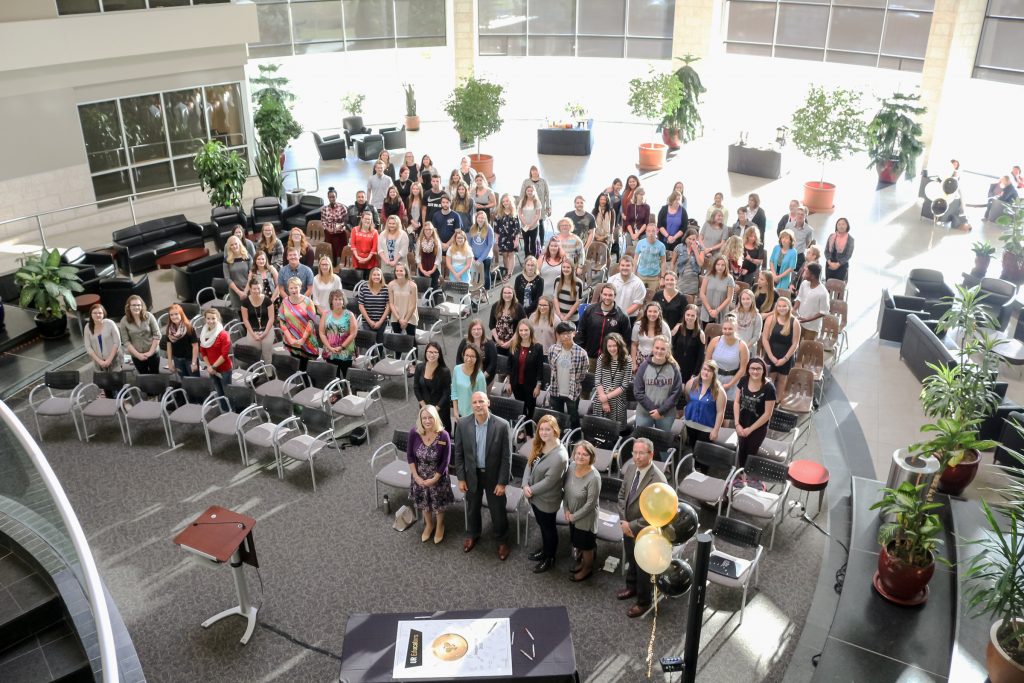
An inaugural UR Educators Event was held on September 29, 2016 to officially welcome new Education students to the teacher profession. New students heard inspirational talks from Dean Jennifer Tupper, University of Regina President and Vice-Chancellor Vianne Timmons, Saskatchewan Teachers’ Federation Senior Staff Administrator Rob Lehne, and Regina Public Schools Deputy Director Mike Walters. The speakers deliberated on all that one can become as a teacher, the difference one can make as a teacher, and the responsibility one has as a teacher and role model for youth. New students received a professional pin and pledge card from Dean Jennifer Tupper and Associate Dean of Student Services and Undergraduate Programs Valerie Mulholland. The students then signed the poster to signify their willingness to take on all that the teaching profession entails. The poster will be framed and exhibited near the Student Program Centre. After a group photo, the participants read aloud from their pledge cards and then enjoyed some refreshments.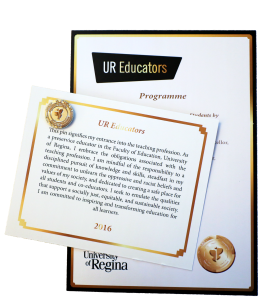
The organizing committee: Dean Jennifer Tupper, Associate Dean Valerie Mulholland, Student Program Centre Manager Nicole Glas, Communications Officer/Publications Manager, Shuana Niessen and Associate Dean’s Assistant Wanneta Martin, who as a new hire came late to the organizing committee, but in the words of the Associate Dean, “hit the ground running, making significant behind-the-scenes contributions to the event.”
(Below is a photo gallery of the event. Slide your cursor over the photo and click on the arrow to see the next photo.)
UR Educators Pin:
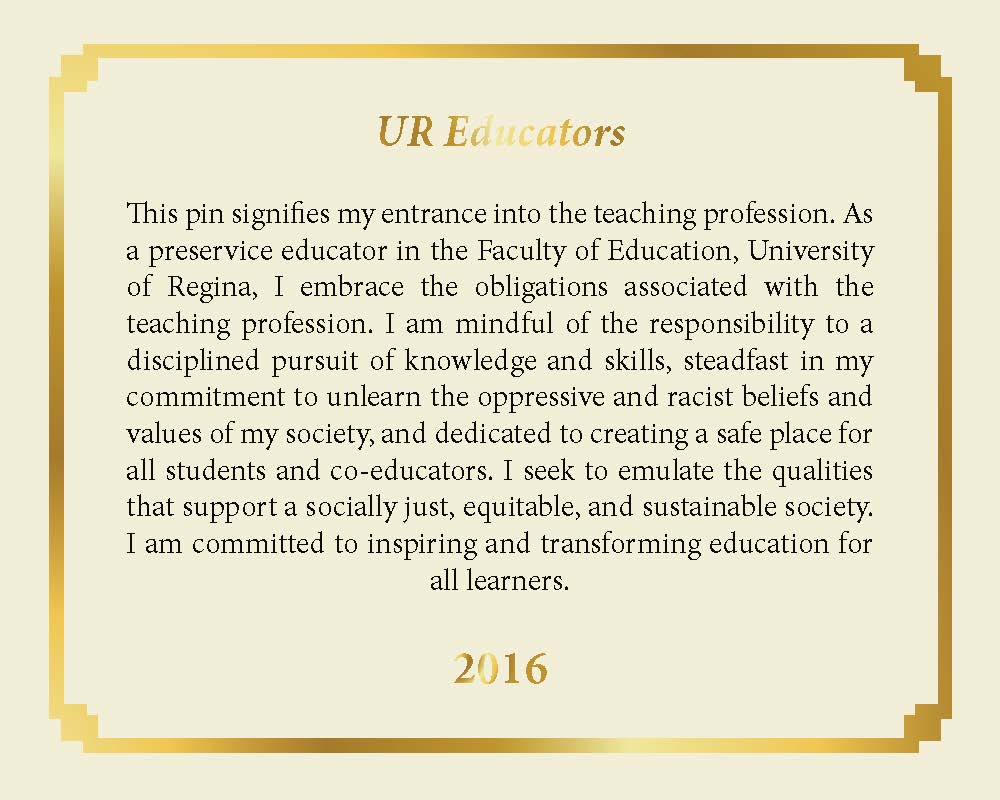
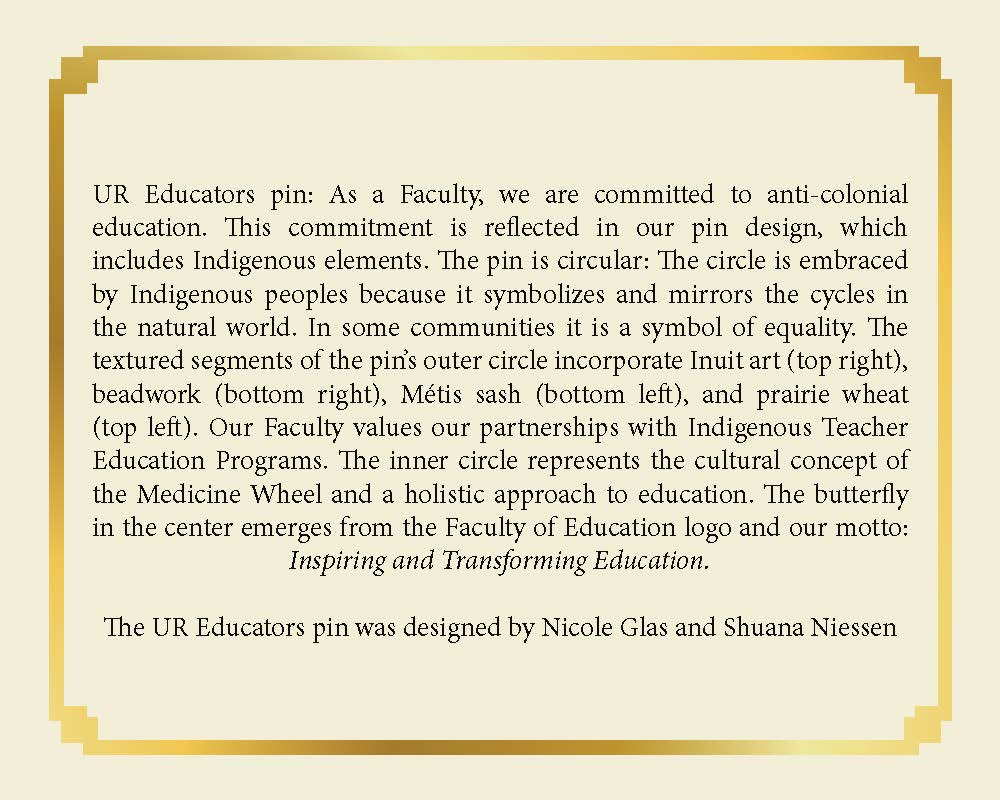
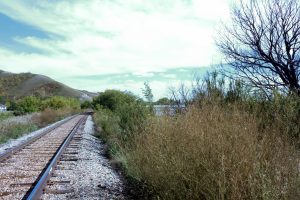 On September 15, pre-intern Arts Ed students met with Grade 8 Bert Fox Community High School students at Fort Qu’Appelle for the 30th Annual Treaty Four Gathering. There the Arts Ed students paired up and joined with an assigned group of Bert Fox students to take part in the tipi activities. After lunch, the students travelled to Lebret, to the site of the Lebret (Qu’Appelle) Indian Residential School. There they heard from Visiting Saskatchewan Artist Daya Madhur and Instructor Denise Morstad who spoke about the significance of the site, connecting it with Treaty 4 celebrations and the impacts of culture and language loss through residential schools.
On September 15, pre-intern Arts Ed students met with Grade 8 Bert Fox Community High School students at Fort Qu’Appelle for the 30th Annual Treaty Four Gathering. There the Arts Ed students paired up and joined with an assigned group of Bert Fox students to take part in the tipi activities. After lunch, the students travelled to Lebret, to the site of the Lebret (Qu’Appelle) Indian Residential School. There they heard from Visiting Saskatchewan Artist Daya Madhur and Instructor Denise Morstad who spoke about the significance of the site, connecting it with Treaty 4 celebrations and the impacts of culture and language loss through residential schools.
Students were encouraged to listen to and learn from the plants and land to create a sense of place in the art that they would produce later that day. (In preparation for this, they had watched Early Fall Medicine Walk with Elder Betty McKenna and If These Hills Could Talk: Daya Madhur)
In smaller groups, students listened to an audio recording of Dr. Shauneen Pete telling about her family’s experiences in the Lebret residential school and how those experiences have impacted generations.
Before students went out individually to explore the site, they were given tea sachets to scatter on a chosen spot as a ritual of asking for teaching from the natural environment. For the rest of the afternoon, students sketched, photographed, and recorded sounds from the environment. They came together again at the end of the day to share their art and reflections. After the Bert Fox students left, the pre-interns debriefed on their experience.
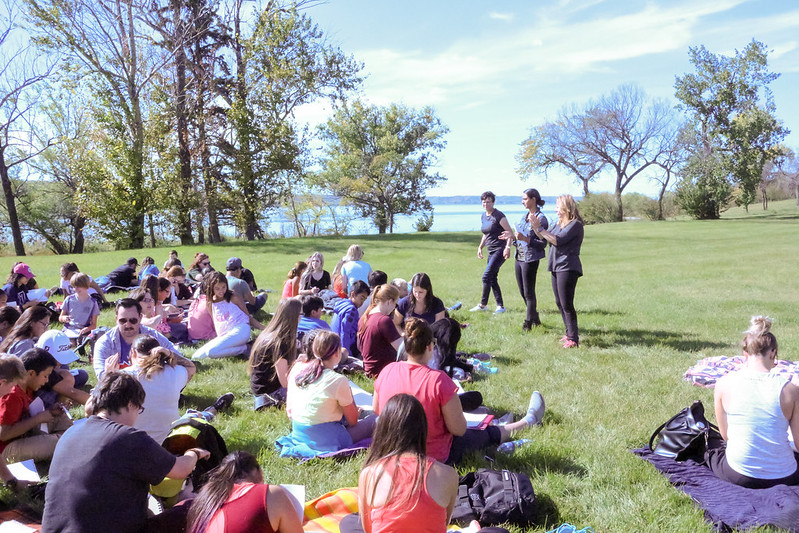
It’s Orientation Day for new students, a day to meet other new students and faculty and a day to find out how to go about being a University of Regina student. The Faculty of Education welcomes our new students! New students attended a morning orientation session where they were introduced to Dean Jennifer Tupper and some of the faculty as well as the Education Students’ Society executive and UR Ambassadors. After the morning session, students met in smaller groups, where they participated in a variety of activities, such as a scavenger hunt (See bottom slide show).
There are activities for all students planned throughout the week so don’t miss out! Follow the ESS on Facebook: https://www.facebook.com/ureginaess/ and Twitter: @ureginaess and follow the Faculty of Education on Facebook: https://www.facebook.com/URfacultyofeducation/ and Twitter: @URFacofEd
The Elementary Education Educators Scavenger Hunt–All the Important Places
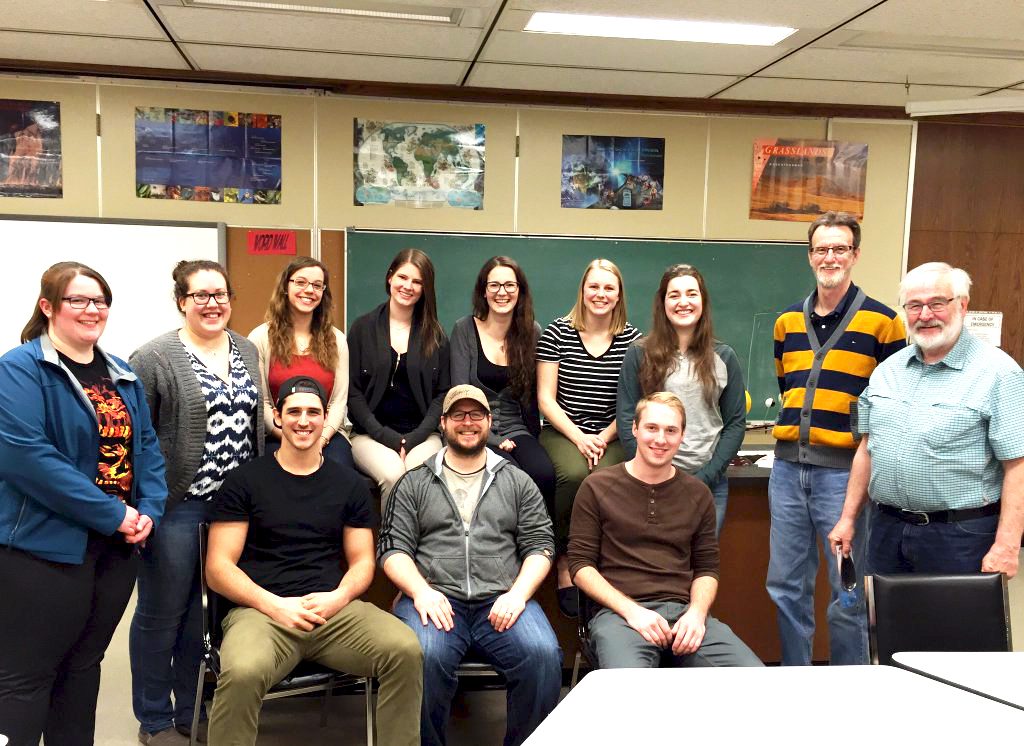
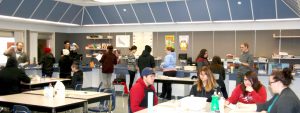 Science Education preservice teachers had the opportunity to take their learning on the road in the winter 2016 semester.
Science Education preservice teachers had the opportunity to take their learning on the road in the winter 2016 semester.
In December 2015, the Yorkton Tribal Council approached the Faculty of Education’s Dr. Shauneen Pete for assistance with science education. Dr. Pete asked Instructors John MacDonald and Michael McCoy, who were teaching secondary science education classes ESCI 350 and ESCI 351, to help out.
With MacDonald’s and McCoy’s support, preservice teachers taking ESCI 350 and 351 planned a two-day session from the Grade 10 curriculum on chemical reactions. Amy Martin explains, “As a class (all 10 of us), we constructed a science unit from scratch, and we actually got to go out and spend two full days teaching science on Kahkewistahaw First Nation and Keeseekoose First Nation reserves.”
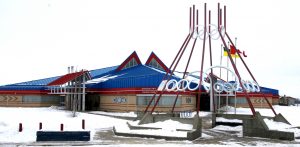 On February 4, the preservice teachers traveled to Chief Kahkewistahaw Community School for the Day 1 activities. Students from Kahkewistahaw, White Bear, Ocean Man, and Ochapowace First Nations participated in the session. The next morning they traveled from Yorkton, where they had stayed the night, to Keeseekoose Chief’s Education Centre. There they had opportunity to work with Grade 10 students from Keeseekoose and Cote First Nations.
On February 4, the preservice teachers traveled to Chief Kahkewistahaw Community School for the Day 1 activities. Students from Kahkewistahaw, White Bear, Ocean Man, and Ochapowace First Nations participated in the session. The next morning they traveled from Yorkton, where they had stayed the night, to Keeseekoose Chief’s Education Centre. There they had opportunity to work with Grade 10 students from Keeseekoose and Cote First Nations.
The following week, they repeated this schedule with Day 2 activities. (However, circumstances prevented them from returning to teach Cote First Nations the Day 2 activities.) The preservice teachers were pleased about this opportunity to work together to develop a series of activities that they also delivered, and the chance to teach at reserve schools, a first for all involved. Instructors John McDonald and Michael McCoy write, “As instructors, we were impressed by the professionalism displayed by our students: the extra work put into developing and organizing the activities, their ability to engage the students in the activities, their ability to reflect on the days activities and incorporate changes for the next day, all served to illustrate the quality of our future professional educators.” The preservice teachers involved were Mari-Anne Berriault, David Brown, Ryan Cherwaty, Shelby Fink, Jenna Hansen, Amy Martin, Laine McLaren, Zach Oleynik, Alyssa Walterson, and Ashley Wiley.
Preservice Teacher Comments:
The experience of teaching at the Kahkewistahaw and Keeseekoose Reserve schools was an eye opening one. The students had only really experienced science through what was taught in their textbooks, so being able to take part in hands on activities was a whole new world for them. It was rewarding to watch them open up throughout the day as they began to get excited about science.
~Alyssa Walterson
Teaching is a profession that is structured on experience. Therefore, as a beginning teacher, this experience was monumental at this point in our teaching career. The ability to experience a diverse culture and environment in a setting that many would not get to experience was a privilege. These short two days allowed me to apply the information being taught in the classroom in a real life setting. One of the most important aspects the experienced offered was the ability to cooperatively plan lessons with fellow students. We grew not only as individuals, but as a cooperative class in order to provide the best experience we could for the students. This to me was the most rewarding experience.
~Ryan Cherwaty
Teaching at the Kahkewistahaw and Keeseekoose Reserves was a great opportunity for us to build some experience working with students who have had very little exposure to science. As a group, we worked hard to design experiments that would engage the students, and spike some interest in a field that they have spent very little time with. For many of the students, this was the first time they were actively participating in hands on science experiments. As the day went on, it was great to see the students excited, engaged, and asking questions. I enjoyed having an opportunity to step out of my comfort zone, and teach in an environment that I have never been exposed to. Experiences like this will only strengthen our platforms as young educators.
~Zach Oleynik
It was a really great experience; my classmates and I were able to gain some experience in co-planning as we created mini lessons for the students. Since there were so many of us, we were able to split the students up into small groups for the lessons, which gave us opportunities to ask the students their thoughts and feelings about being taught science and what they thought about the lessons that we had created.
~Ashley Wiley
Photo Gallery
;
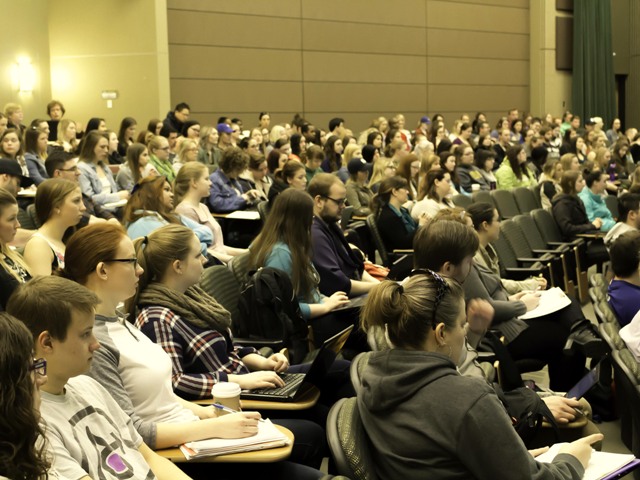
There was an atmosphere of excitement and anticipation as students who have completed their 3-week pre-internship block congregated to attend an Internship Orientation this morning in the Education Auditorium.
In the late summer and fall, students will also participate in Internship Seminars where they will meet the teachers with whom they will be working. The interns will then be going out into schools for their fall 2016 semester.
Through their classes, students have been preparing and planning units for their teaching practicums, (and some of their summer will also be used for preparation). In their internship, they will be teaching entire units to students in schools and engaging with the realities and busyness of teacher life.
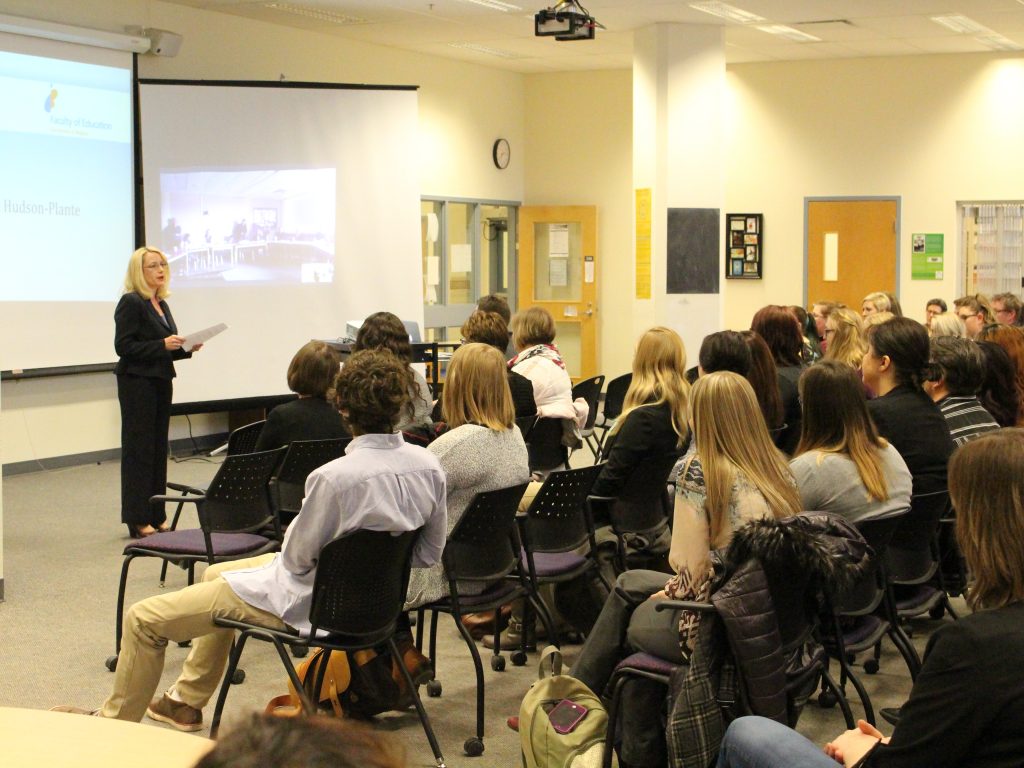
On April 6, the Faculty of Education, SUNTEP and YNTEP gathered to celebrate student success. This year was different than previous years: The coordinators from the Student Program Centre, Dr. Val Mulholland, Nicole Glas, and Wendy Campbell, invited faculty from SUNTEP, YNTEP, and the various Faculty of Education programs and student societies to forward a list of students who have made contributions to learning and to leadership in the Faculty of Education through scholarship, activism, and engagement in coursework. In previous years, academic excellence was the only success that was celebrated. There were 166 students honoured at the celebration and their names were scrolled individually across the screen throughout the event.
Dr. Jennifer Tupper, Dr. Val Mulholland, and Dr. Michael Cappello highlighted and honoured not only the students’ achievements in their classes, but also in their field placements, and in the community.
After welcoming the students and their families, Dr. Val Mulholland said, “You have been recognized by faculty members or program for having made a significant contribution to teaching, learning and/or leadership in the classes, in field placements or beyond classroom walls.”
Dean Jennifer Tupper said, “This celebration is more than recognizing academic excellence, which we value. It is recognition of our students taking seriously their call to teach for a better world, to inspire and transform education – which many of you may know is the motto of this faculty.”
And after listing some of the amazing initiatives with which students have been involved, such as the STARS Regina’s #TreatyEdCamp, and other sessions working towards social justice; the Science Education students’ work with Treaty 4 schools; and the ESS’s PD opportunities, Dean Tupper said, “What I am struck by in my conversations with our teacher candidates is their passion for teaching and learning in the midst of the many challenges schools and teachers are facing. I am struck by their commitment to social justice, and their desire to create meaningful and transformative learning experiences for young people in schools. They are thoughtful, compassionate and courageous.”
Dr. Michael Cappello spoke about the students’ exceptional contributions which are helping to shape the field of education even before entering it as teachers.
Also unique to this celebration was the Skype connection with YNTEP students and faculty who are located in Whitehorse, Yukon. Through this connection, Faculty of Education and SUNTEP members were able to participate in the YNTEP celebration, and YNTEP students participated in the Regina celebration. Dr. Andrew Richardson, Dean of Applied Arts for Yukon College, spoke on behalf of YNTEP, recognizing the following YNTEP students:
Candice Cockney
Judy Leamon
Meghann Meadowcroft
Dwight Snowshoe
The following is the list of Faculty of Education and SUNTEP students celebrated:
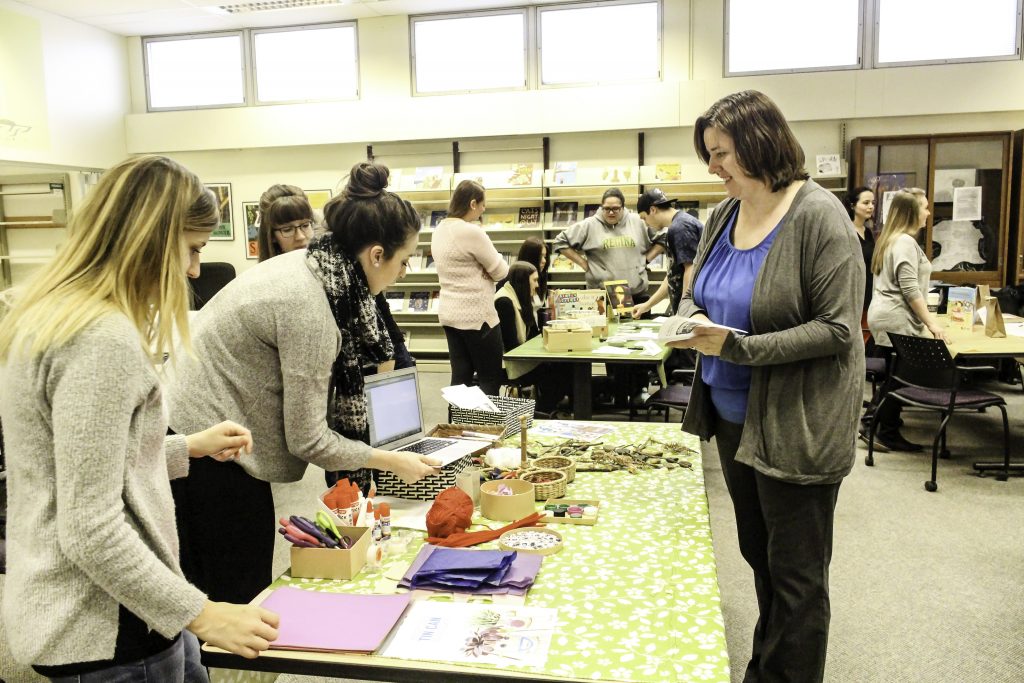
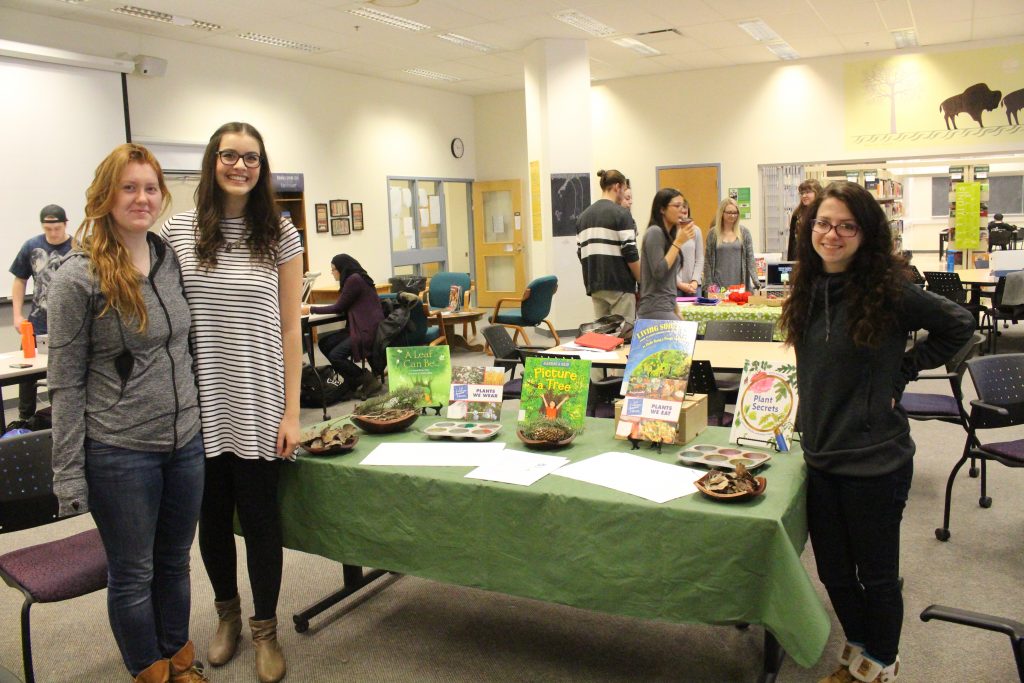
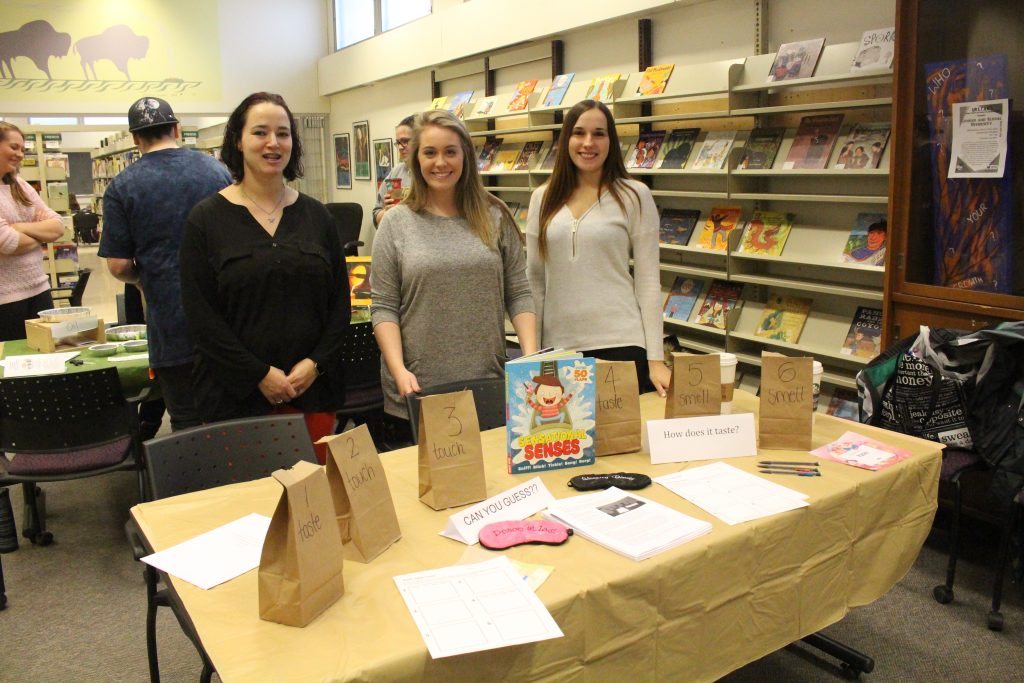
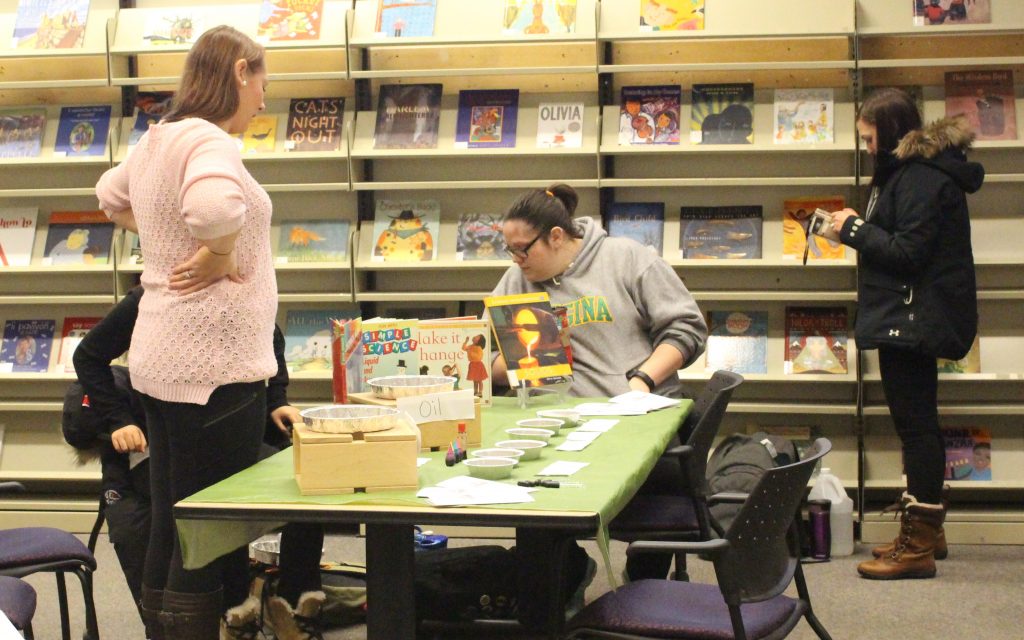
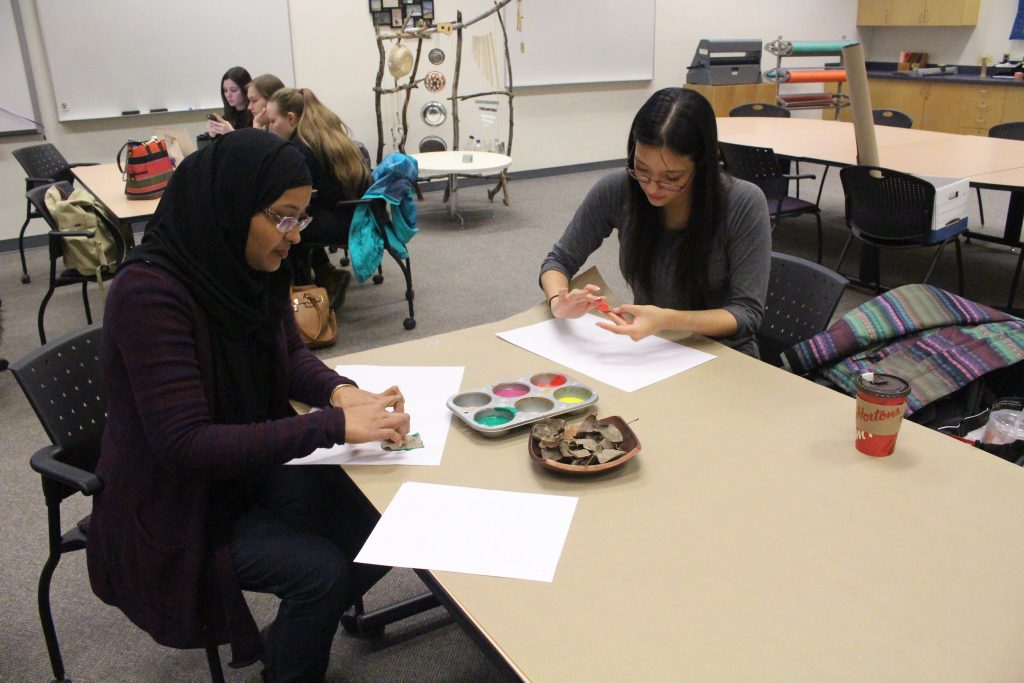
Later that day, the workshops were viewed by Campus Regina High School Students.